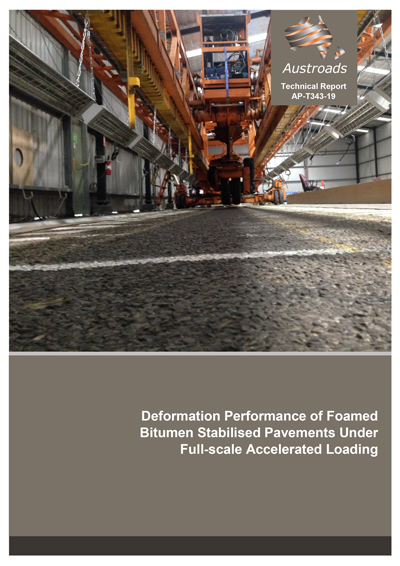Wednesday, 6 March 2019

Austroads has released a report detailing the findings from the first phase of a project to evaluate the deformation performance of foamed bitumen stabilised materials.
Foamed bitumen stabilisation involves insitu or plant mix stabilisation of pavement materials with bitumen as the primary binder. The process is used to improve the strength of granular materials while retaining a flexible pavement.
Austroads project TT2046 is assessing the field performance of in situ foamed bitumen stabilised materials under full-scale accelerated loading and consists of two phases.
This first phase included:
- evaluating early-life deformation
- measuring long-term deformation characteristics under warm climate conditions
- benchmarking the foamed bitumen stabilised base performance with an asphalt control section
- evaluating the effects of recycling reclaimed asphalt pavement (RAP) in the foamed bitumen stabilised base.
The project assessed a crushed rock and a 50% reclaimed asphalt pavement blend using the ARRB accelerated loading facility (ALF). The ALF is used to simulate heavy vehicle trafficking on pavement structures under controlled conditions. You can see it in action in the video below.
Early-life performance was investigated by trafficking two days after construction and sealing. The performance was also evaluated after at least three months of curing. The deformation characteristics were measured with the test pavement heated to around 40 ⁰C at mid-depth to simulate warm weather conditions. The performance of the cured pavement was benchmarked by testing an asphalt test section of known field performance. For both conditions the accelerated loading facility was equipped with a dual-wheel assembly loaded to 50 kN.
The main findings were:
- The test pavement showed limited pavement surface deformation and low deformation rates under accelerated loading for both the early-life and cured conditions.
- When tested at the same temperature, the 50% RAP did not impact significantly on the performance of the pavement.
- The foamed bitumen stabilised pavements performed well compared with the asphalt control.
The project concluded the overall good deformation performance of the foamed bitumen stabilised materials. Subsequent laboratory wheel-tracking tests will be performed to confirm the finding at higher temperature.
In the next phase of the project, laboratory wheel-tracking tests will be performed to complete the assessment of the deformation performance of foamed bitumen stabilised mixes.
Report link: Deformation Performance of Foamed Bitumen Stabilised Pavements Under Full-scale Accelerated Loading
